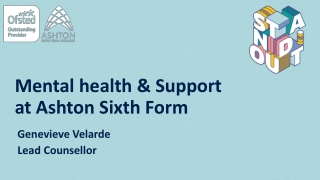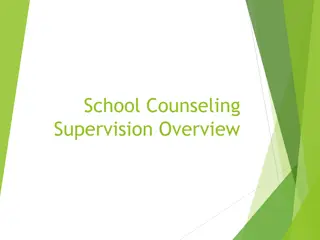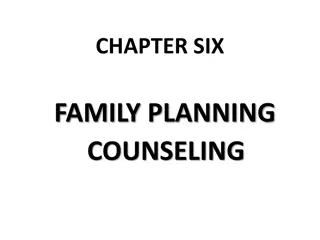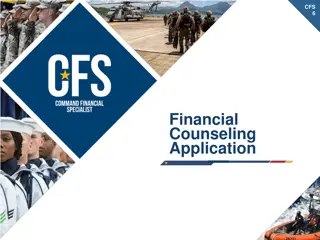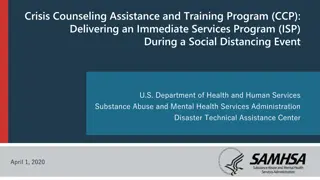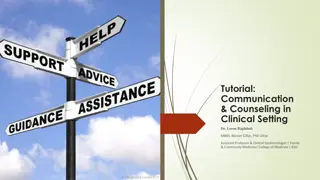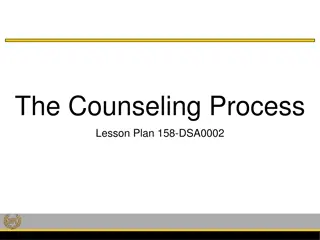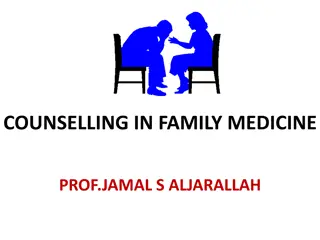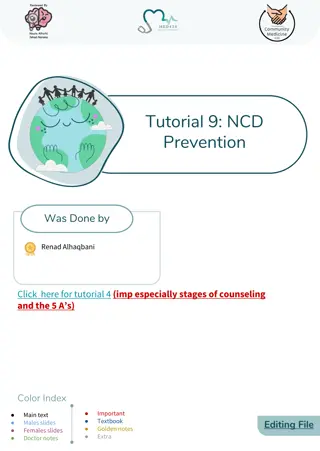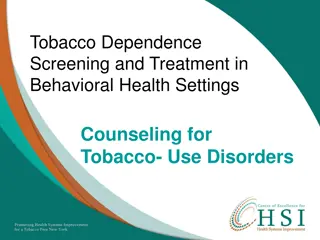Developing Effective Counseling Techniques
This module delves into various conversation styles, focusing on utilizing forward-focused questions, asking insightful questions to guide progress, and eliciting responses effectively. It also covers seeking permission before providing advice and setting SMART goals for successful outcomes. Enhance your counseling interactions with practical strategies and techniques.
Uploaded on Feb 22, 2025 | 0 Views
Download Presentation

Please find below an Image/Link to download the presentation.
The content on the website is provided AS IS for your information and personal use only. It may not be sold, licensed, or shared on other websites without obtaining consent from the author.If you encounter any issues during the download, it is possible that the publisher has removed the file from their server.
You are allowed to download the files provided on this website for personal or commercial use, subject to the condition that they are used lawfully. All files are the property of their respective owners.
The content on the website is provided AS IS for your information and personal use only. It may not be sold, licensed, or shared on other websites without obtaining consent from the author.
E N D
Presentation Transcript
DEVELOPMENTAL COUNSELING INTERACTIONS Module 6
DIFFERENT CONVERSATION STYLES Directing Guiding Following Soldier Leader Soldier Leader Soldier Leader
STICK WITH FORWARD FOCUSED QUESTIONS Avoid Why did you do that? Why did you forget to submit the form? Try How can you fix this? What s your plan to make sure the form gets submitted next time? How will you make sure you re here on time tomorrow? Why are you late?
What would be the first step? What would you need to do to make that happen? How can I help you? What do you need? What would that look like? Where would you start? What would happen next? What are some things that might get in your way? How would you deal with that? If you re at a 2 now in your progress, what would it take to get you to a 3? ASK QUESTIONS LIKE THESE
ELICIT PROVIDE ELICIT So what s your plan? That s right. I ve also seen that What do you know about ? So what s your first step? What are you thinking you ll do about ? That s right. Another thing you might consider is
Ask for permission. Would it be okay if I gave you some information about If you don t mind, let me give you a suggestion here Preface advice with permission to disagree. This may or may not apply to you, but GIVE ADVICE WITHOUT TELLING SOMEONE WHAT TO DO Give a menu of options. There are a couple things you could do here Emphasize personal choice. but again, you ll have to decide what will work best for you.
SETTING SMART GOALS Key Question What specifically do you want to achieve? How will you know if you ve reached your goal? What resources are needed? Is the goal reasonable? Example I d like to get more experience in air defense. When I leave the Army, I d like to get my degree in aviation or aerospace engineering. I would need to apply to Air Defense Artillery School. I have a good head for numbers. Aerospace is a big industry where I live. In the next week, I d like to do some research on what training programs are available. Specific Measurable Attainable Realistic Time-Bound When will each of the steps be completed without kicking the can down the road?
What questions could you ask to make this goal Specific Measurable Attainable Realistic Time-bound SOLDIER SAYS: I KNOW I NEED TO IMPROVE MY PT SCORE.
What questions could you ask to make this goal Specific Measurable Attainable Realistic Time-bound SOLDIER SAYS: I VE GOT TO LOSE SOME WEIGHT. MAYBE FIVE POUNDS.
EXAMPLE: EFFECTIVE DE-ESCALATION AND PLANNING https://youtu.be/e6f5UqYtkkc
HOW DID THE NCO DEMONSTRATE GOOD LISTENING AND MOVE THE CONVERSATION TOWARDS A SOLUTION?
PROMOTE PROFESSIONAL DEVELOPMENT DURING COUNSELING LEADERS AND SOLDIERS COMPLETE PARALLEL FORMS TWO-WAY, INTERACTIVE CONVERSATION SHARE OBSERVATIONS, EXPECTATIONS, DEVELOP COLLABORATIVE PLAN COUNSELING ENHANCEMENT TOOL (CET)
Tactical and Technical Proficiency Manages Personal Matters Communicates Effectively CET Exhibits Fitness, Military Bearing and Appearance Exhibits Effort Exhibits Personal Discipline Contributes to the Team
Before the meeting: 1. Ask Soldier to complete Soldier version 2. Give Sustain/Improve rating for each area (Section A) 3. Make notes about Soldier s behavior, including areas of strength and opportunities for growth (Section B)
During the meeting: 1. Use questions to elicit Soldier s input on % met in each area (Section C). Reflect and summarize 2. Share observations and elicit Soldier input, with a focus on areas of strength 3. Use questions and reflections to negotiate SMART goals, barriers and resources (Question 8) 4. Summarize the interaction
Example: How often do you believe you ve met this expectation? [Open Question] So you think [Reflection]. From my perspective I might add [Information] What are some areas for improvement from your perspective? What would it take to improve by 5 or 10%? [Open Question] That s a good idea to [Affirm] There s a couple other options you might consider, for instance [Provide Menu] Which one of those might work? [Open Question] Let me summarize what we ve talked about so far [Summary]
Example: One of the areas you said you wanted to improve was One thing you wanted to do was [Reflection] What s one goal you would like to set in that area? What s the timeframe? How can I assist? [Open Question] OK, so you want to and you think that [Reflection] In addition, I d like to challenge you to [Information] What would it take to improve in that area? [Open Question] So you think you can [Reflection] What are some things that might get in the way? How could you troubleshoot? [Open Question]
Returning from deployment; reputation for being smart, a leader When in garrison, history of poor performance and heavy drinking Previous arrest, license suspension for DWI At times, was a poor influence on other squad members Married with two young children On time to formation this week, but looks worn out SOLDIER A How would you conduct a counseling session with the CET?
Newly enlisted Fair work ethic, but lacks many life skills History of poor financial decisions Puts little effort into training, spends time eating junk food and playing video games Seems easily influenced. You re worried other soldiers may be a bad influence on him SOLDIER B How would you conduct a counseling session with the CET?
COUNSELING DEBRIEF What change talk did you notice? What(s) goal did you set? What kind of follow-up would you want to have with this Soldier?
EXAMPLE: EFFECTIVE LISTENING AND PLANNING AFTER A DISCOURAGING EVENT https://youtu.be/I-gda2p5mZI
HOW DID THE NCO USE EFFECTIVE LISTENING TO DEMONSTRATE UNDERSTANDING AND MOVE TOWARDS SOLUTIONS?
MODULE 6 DEBRIEF Write down one thing you learned in this module that stands out
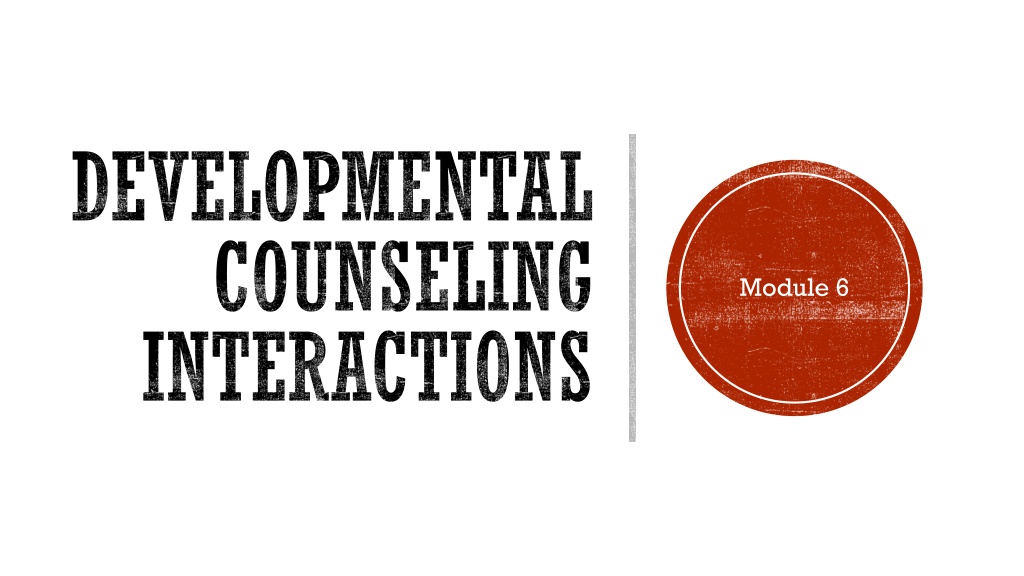
 undefined
undefined








